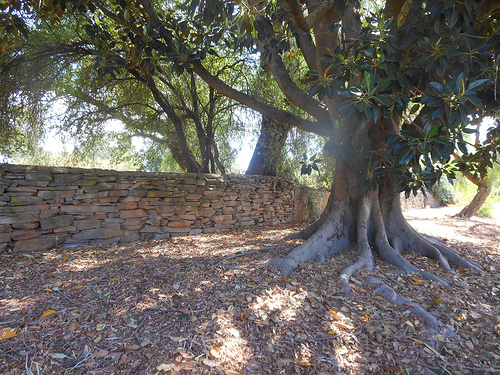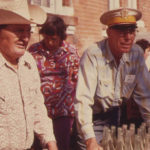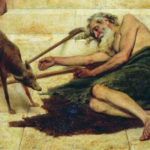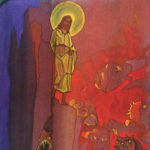We run our website the way we wished the whole internet worked: we provide high quality original content with no ads. We are funded solely by your direct support. Please consider supporting this project.

Why Did Jesus Curse the Fig Tree?
One of the strangest episodes recorded in the Gospels is Jesus cursing a fig tree because he was hungry and it didn’t have any figs (Mk 11:12-14; Mt 21:18-19). It’s the only destructive miracle found in the New Testament. What’s particularly puzzling is that Mark tells us the reason the fig tree had no figs was because it wasn’t the season for figs.
On the surface, it might look as if Jesus simply lost his temper and used his supernatural power to punish a poor tree whose only crime was being in the wrong place during the wrong season. Most commentators argue that the fig tree represented Israel and Jesus was symbolically warning that judgment was coming if it didn’t start bearing fruit. This is probably correct, but I don’t think it addresses the most profound significance of this event. If we understand this episode against the background of the apocalyptic thought of Jesus’ day, we can discern another layer of meaning.
Famine was widely believed to be the work of the devil in apocalyptic thought, and barren or infected fig trees became symbols of this fact (Mk 13:8; Rom. 8:35). What is more, many Jews of this time believed the Messiah would free nature from Satan’s grip, thus putting an end to things like famines. When we interpret Jesus’ cursing of the fig tree in this light, it seems evident he was proclaiming that he was the Messiah by “cursing the curse.” And in doing so, he symbolized that he was the long awaited one who would “destroy the devil’s work” (I Jn 3:8) and restore creation.
More generally, Jesus was thus demonstrating that, where God reigns, the demonic corruption of nature will be in the process of being overcome. And he was showing that, when the Kingdom is fully manifested, the whole cosmos will be delivered from the oppressive Powers. There will then be no more famine, droughts or hunger. Nature shall produce abundant vegetation and fruit, as it was always intended to do.
Something similar could be said of other “natural miracles” performed by Jesus. When Jesus miraculously fed the multitudes (Mk 6:30-44; 8:1-10) and brought about a miraculous catch of fish (Lk 5:3-10; cf. Jn 21:1-8), we can understand him to be enacting the truth that when the future Kingdom comes, humans will be reinstated in their proper place of authority, exercising dominion over nature. Consequently, there will no longer be any shortages of food.
So too, when Jesus raised people from the dead, and when he himself was raised from the dead, he was revolting against the reign of death and the one who holds the power of death (Heb. 2:14). And in doing this, he was pointing to a time when “the last enemy” would be utterly destroyed and death would be no more (I Cor. 15:26.)
So, Jesus cursing of the fig tree wasn’t the result of a temper tantrum. Jesus was cursing the curse and revealing himself to be the long awaited Messiah who would eventually free creation from the bondage of Satan.
Image by Royston Rascals via Flickr.
Related Reading

What Did Jesus Mean By Saying We “Will Do Even Greater Things Than These”? (podcast)
John 14:12-14 12 Very truly I tell you, whoever believes in me will do the works I have been doing,and they will do even greater things than these, because I am going to the Father.13 And I will do whatever you ask in my name, so that the Father may be glorified in the Son.…

Who Rules Governments? God or Satan? Part 1
Running throughout Scripture is the motif that depicts God as the ultimate ruler of the nations. On the other hand, the NT teaches that the ruler of nations is Satan. What do we do with these two apparently conflicting motifs? First, because OT authors tended to understand the creation along the lines of a king-centered…

What About Violence in the Parables? (podcast)
Greg examines the harsher parables. Episode 524 http://traffic.libsyn.com/askgregboyd/Episode_0524.mp3

Love Conquers All
Paul prayed in this way for the church at Ephesus: I pray that, according to the riches of his glory, [God] may grant that you may be strengthened in your inner being with power through his Spirit, and that Christ may dwell in your hearts through faith, as you are being rooted and grounded in…

Reflections on the Supremacy of Christ (Part 2)
Whereas most Christians place the revelation of God in Christ alongside of other portraits of God and end up with an amalgamated image of God, we at ReKnew encourage believers to base their understanding of God completely on Christ, and especially on Christ crucified. And we encourage disciples to work to reinterpret through the lens…

Podcast: Did Jesus Descend Into Hell?
Greg psychologizes Christ on the cross. http://traffic.libsyn.com/askgregboyd/Episode_0343.mp3
